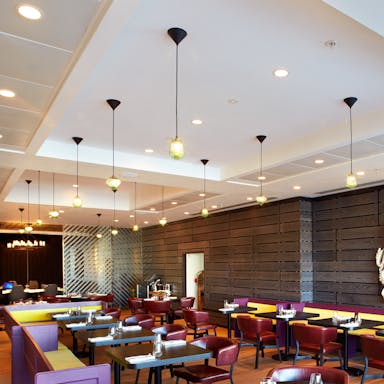From a nurse’s perspective
Nurses spend a lot of time with patients, and those interactions influence how the patient experience hospital care. The work environment plays a vital role in how healthcare professionals can welcome and engage with patients. When nurses experience a good and healthy work environment, patients seem to have a positive experience with the nursing care. (2)
A healthy work environment in hospitals is defined as an ability to achieve the goals of the healthcare facility while deriving personal satisfaction from their work.
To learn more about what an average day for a nurse looks like, we spoke with four nurses. Three of them work at the Pediatric department and one at the Oncology department.
Can you describe a regular day for you?
Christine: I am working at the Oncology Department, and I typically start my day from 07:00. The attending nurses begin the day together in an office and go through the list of patients; we hand over important information and assign the patients among ourselves.
We’re a big team, and we work very closely together and get support from each other. After we have our assigned patients, my direct reports meet in a smaller office with more quietness to focus, and we discuss the patients in more details. We have a small computer room where we can quietly read up on the different patients and plan for the day. I start with one patient, waiting for the doctor to arrive; I give them their medication and try to make the atmosphere comfortable, making them feel calm and relaxed.
Camilla: I am working as a pediatric nurse, and I usually meet at 07:00. I am a part of a big team, and together we go through the activities from the day and make a game plan for the evening. After the briefing, I usually take my patients journals to the computer area and carefully read them.
Pernille: I work as a pediatric nurse, and my shifts change. I am part of a big team where we work collaboratively and support each other. Whenever I meet during a day, we have a briefing session to review the patients, the new inpatients, and schedule the shift. It differs how many patients I have, but I carefully read their information to prepare. After discussing the day's plan, the doctor arrives to brief us on any potential discharges, change in processes, or any operations that need preparation.
Johanne: We start the day with a briefing to go over all the patients. We’re all gathered in the same room, discussing the activities, daily tasks, and new patients. We divide the patients among ourselves, and we see if any other departments need help. It varies how many patients I have, but typically I have between 2-4 patients. I need to be present when the doctor is coming to deliver results or a game plan for a child. The rest of my day is spent giving medicine, talking with the patients and preparing children for treatments.
What is the biggest reward you get at work?
Christine: I get a warm feeling inside when I see a child making progress and seeing the parents get calmer and more relaxed seeing their child getting better and better. I do a valuable job to improve the life quality and well-being even though it’s a horrible situation. The small things we do every day influence the persons' life.
Camilla: I can see the progress, especially the joy that fills the children and their parents when it's going in the right direction. I am a pediatric nurse, but we also help the parents.
Pernille: I must say the happy face on the child when hearing the words “you can go home”. The joy on their face is everything for me that I have helped them through a difficult situation. Also, to see how the parents develop through the process. Normally they are frustrated when they arrive with their child and to see how much they grow through the process.
Johanne: I value my job because I am in personal contact with families, and I try and make them feel comfortable. I need to make them feel heard, and the best part is when the treatment works and the child is getting better. I like seeing how they jump around and making all of us laugh.
What challenges do you see during your workday?
Christine: It must be the logistic challenges for coordinating and planning a patient's process. I spend a lot of time contacting people and waiting for answers. I also struggle to find peace during the day when I need to focus and concentrate on a patient's file. It sometimes affects how well I can do my job.
Camilla: Feeling inadequate! It’s the biggest challenge, and I don’t like feeling like that. We’re the middleman between the doctor and the family. We’re the direct link, so we’re always caught in the middle. We don’t make the changes, the doctors do, but we’re their closest person. It is challenging as I can only be there for the families.
Pernille: The uncertainty. We can do all sorts of things, but we don’t control the treatment or progress. I feel frustrated when we’ve followed the game plan, and it’s not helping. I find it challenging during my day. Otherwise, obstacles like coordinating and planing a patients’ game plan and making the patients feel at home.
Johanne: I find it challenges to deliver messages about how the treatment didn’t work as planned, or the patient needs to stay longer. I feel inadequate! I can mention logistic challenges, but not being able to be helpful with recovery is one of the biggest challenges in my job.
How is the indoor climate at the hospital?
Christine: At my department, I think the indoor climate is good, but in the hospital, it’s horrible. The lack of daylight, the availability to open windows, and the noise from alarms, machines, carts, conversations and people walking by is terrible. There are good and bad noises in the section. And I think there are good solutions to shield the noises from patients.
Camilla: There is a horrible indoor climate! There is no possibility of getting fresh air insides because the windows are old and broken - so we can’t get air to circulate. There are terrible lighting conditions as it’s either too bright or too dark, and there is no possibility to adjust it.
At times, there is a lot of noise from alarms, conversations with patients and equipment being moved. But that’s a part of the job. The noise that frustrates me the most is the chitchat between us nurses. It affects me when I need to concentrate and focus on a patient and prepare myself.
Pernille: Now it’s an old hospital, so the indoor environment is not very good or modern. There are old windows, old lamps and old floor tiles. And that adds up. We try to open windows, but we also need to consider the patients. And we have a strict hygiene policy, so everything needs to be clean.
Johanne: Indoor climate is non-existing. It’s an old building with very few new things, so I am looking forward to the new hospital we will move into soon. Hopefully, there are better materials to secure indoor quality.
Can you find peace during a workday?
Christine: I struggle to find peace and quietness during the day. There is excessive talking, foot traffic, porters coming and going with patients, telephones, etc. However, I can find peace in our computer rooms if necessary.
Camilla: Peace and silence are in the bathroom. If I need a moment of peace, I go to the bathroom. During the day shifts, there is a lot of noise from all sorts of things. There is less noise during the evening shifts as we’re only nurses at work, and during the night shifts, it’s silent as every patient is asleep.
Pernille: It happens. But not very often. It’s a part of the job to be alert and available, but I would like to have more spaces for silence or a place to go to clear my head.
Johanne: It happens. Typically, it’s busy, and I can always ask my colleagues to lower their voices in our office and eating area if needed. But it’s a part of the job, but I can find peace if necessary.
How do you feel when you arrive home after a shift?
Christine: I feel tired. I entirely give myself to my patients and engage with them all the time, trying to understand them, make them feel heard and comfortable. I am aware that all the inputs I experience throughout the day affect me, and every slight noise influences me and tires me. I can still do stuff after work, but I see that my work affects me.
Camilla: I am not completely drained of energy, but I can feel that I have been at work. The inputs, small talk and conversations demand energy, and I notice that, but I would say that I am getting used to the noise and the atmosphere.
Pernille: It depends on the day. I have days where I am totally swamped and want to take a few minutes for myself when I arrive home if it has been a stressful day, but I have days where I'm inspired and motivated to be at work.
Johanne: My days varies, and the influence it has on me also differs. I can feel drained and just want to lie on the couch, and then there are days where I feel fine, and I do not feel as though I have been at work. So, it depends.
If you could choose, what would you want to change or improve at the hospital?
Christine: I will choose to get more “quiet” areas to focus and concentrate in. Spaces to recharge, preferable one-person rooms that can be reserved and where I can go and thoroughly read my patients file and prepare. We also do some training, and that needs concentration to prepare.
Camilla: My wish list would be better lighting, better windows, with the possibility to open them, and acoustic solutions for privacy and better acoustics. We work collaboratively, so we can't isolate ourselves during the day, but it would be great to have better settings in the offices for better privacy. Also, patients can hear each other in one patient room to the other, which can negatively influence them.
Pernille: Better light and better materials. More space. I want to improve our break areas and office spaces.
Johanne: As mentioned before, I would like the possibility to open windows and adjust the light.
What made you want to become a nurse?
Christine: The fact that I am the first person the patient and their family meet. The personal contact and that they depend on my colleagues and me. I like being with people, and then being able to help them in some of the worst situations gives so much to me.
Camilla: The combination of people and me not being able to sit still. With my role, I can improve the quality of life of a patient. I have my fingers on the pulse, where I need to decide what to do. It triggers something within me to assess a situation and find my role in it to transform a hectic situation into a calm one.
Pernille: Using my competencies in a valuable setting. I need to read people and figure out how I approach the patient best and help them through the crisis.
Johanne: I decided to become a nurse because I like being surrounded by people. And then it’s a plus that I can help them and improve their lives.
Make your healthcare sound better
It’s not possible to remove all levels of noise pollution we experience. The healthcare environment should be seen as a home away from home for patients, and the nurses should feel comfortable doing their job without considering how much they disturb patients with noise.
The use of acoustic solutions for the indoor environment is an excellent way to regulate reverberation and reduce many adverse side effects commonly associated with exposure to noise pollution. By managing the noise problems with the acoustic ceiling and wall solutions, the hospital significantly decreases side effects like stress symptoms, fatigue and improves overall wellbeing.
Sounds beautiful
References:
(1) Hagerman, I., Rasmanis, G., Blomkvist, V., Ulrich, R., Eriksen, C. A., & Theorell, T. (2005). Influence of intensive coronary care acoustics on the quality of care and physiological state of patients. International Journal of Cardiology, 98(2), 267–270.
(2) Kieft, R.A., de Brouwer, B.B., Francke, A.L. et al. How nurses and their work environment affect patient experiences of the quality of care: a qualitative study. BMC Health Serv Res 14, 249 (2014). https://doi.org/10.1186/1472-6963-14-249




